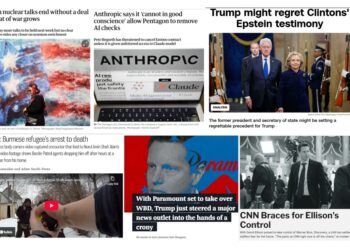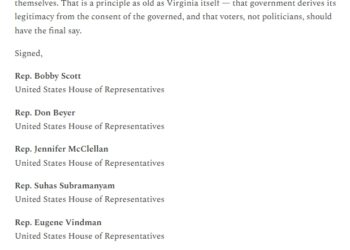is a remarkable document, not known to many, written by Mark Twain as a protest to the U. S. military intervention in the Philippines after the end of the Spanish-American War. At first rejected for publication, it appeared in Harper’s Monthly in November, this month, in 1916. The background and complete text may be read here. Below the fold I will offer a small part, the actual “prayer” itself.
I am nearing the end of a remarkable weekend, the celebration of the 80th year of Pendle Hill, the Quaker retreat and study center in Wallingford, PA. I am moved to offer this piece by my encounter with a remarkable man named Robin Harper. Let me tell you a bit about him and then end with the excerpt from Twain in his honor.
Robin Harper is a man of principle. He is a War Tax Resister. Now 82, he began his resistance during the Korean War.
The idea of resisting war taxes has a noble American origin – that of Henry David Thoreau who refused to pay his taxes for the Mexican War, an aggressive action by the United States to seize territory primarily for the expansion of slavery. I might note that a young Illinois Whig Congressman named Abraham Lincoln also opposed that war and it cost him his House seat. In Thoreau’s case, he was arrested for failure to pay his taxes. While incarcerated he was visited by his friend Ralph Waldo Emerson and we are told the following exchange occurred:
Emerson asked Thoreau, “Why are you here?”
Thoreau answered Emerson, “Why are you not here?”
Emerson paid the money owed by Thoreau, who was therefore released after one night in jail.
Robin Harper decided he was not willing to pay taxes to support the Korean War. Since then he has refused to pay taxes to support America’s military machine in any fashion. This has meant working at such low income as to not have federal income tax liability. It also means finding an employer willing not to withhold taxes other than payroll taxes from even that meager income. For many years Robin worked on the grounds here at Pendle Hill. He received a quite nominal salary plus room and board, a salary equal to that of any one else – the director or the cook, the dean of studies or the person in the mailroom.
Our principle speaker, the well-known teacher and writer Parker Palmer, honored Robin’s commitment during his address last night. As he himself wrestled with his own opposition to war Robin taught him in a very Quaker fashion, to do what he could within his own life. It reminded me of the words of George Fox to William Penn, the latter wondering how he could continue to wear the sword that was part of his office and still be a Quaker and Fox telling him to wear it as long as he could – each of us addresses the challenges we encounter as we are ready, and a wise counselor encourages us by affirming what we can do.
For Samuel Clemens, aka Mark Twain, his gift was the power of his words.
He offered a scenario of a minister praying on behalf of the troops about to go to war. Those words are not the real prayer, but you can read them. Suddenly an aged visitor appears, explains he is from the Most High God who hears all prayers, spoken and unspoken. He is prepared to grant both prayers, if that is what one really wants. He then offers aloud the unspoken prayer behind the spoken words.
Imagine if you can that setting. Or better still, after you have read what I have offered hear, go and read the entire piece.
Here are the words of that unspoken prayer:
O Lord our Father, our young patriots, idols of our hearts, go forth to battle — be Thou near them! With them — in spirit — we also go forth from the sweet peace of our beloved firesides to smite the foe. O Lord our God, help us to tear their soldiers to bloody shreds with our shells; help us to cover their smiling fields with the pale forms of their patriot dead; help us to drown the thunder of the guns with the shrieks of their wounded, writhing in pain; help us to lay waste their humble homes with a hurricane of fire; help us to wring the hearts of their unoffending widows with unavailing grief; help us to turn them out roofless with little children to wander unfriended the wastes of their desolated land in rags and hunger and thirst, sports of the sun flames of summer and the icy winds of winter, broken in spirit, worn with travail, imploring Thee for the refuge of the grave and denied it — for our sakes who adore Thee, Lord, blast their hopes, blight their lives, protract their bitter pilgrimage, make heavy their steps, water their way with their tears, stain the white snow with the blood of their wounded feet! We ask it, in the spirit of love, of Him Who is the Source of Love, and Who is the ever-faithful refuge and friend of all that are sore beset and seek His aid with humble and contrite hearts. Amen.
The listeners are then challenged – “Ye have prayed it; if ye still desire it, speak! The messenger of the Most High waits!”
And the response? Twain ends his piece with these words:
It was believed afterward that the man was a lunatic, because there was no sense in what he said.
Ponder that final sentence. Then go and reread the “prayer.”
Then ponder what our government, the world’s sole remaining military super-power, does ostensibly in our name.
I wonder what Mark Twain would write about our invasion of Iraq, our use of drones in Afghanistan.
This weekend I met Robin Harper, a man willing to sacrifice all most would hold dear on behalf of his principles, a man dedicated to non-violence.
Among the words I wrote down from Parker Palmer’s talk are these:
Non-violence is a form of deep engagement with the world.
To be deeply engaged, one must be attentive, aware of the impact of one’s words and actions.
Clearly Robin Harper is deeply engaged with the world.
So is Parker Palmer.
So was Mark Twain.
We will not all respond to the challenges we encounter in the same way. We are different, and we must honor those differences.
We should honor those willing to accept the consequences of living by their principles even if we disagree with their principles. Remember, the Robin Harpers of the world do not impose their belief upon us, rather they present us with their commitment.
True non-violence is a way of living. I cannot say that I have achieved it, for I acknowledge my willingness to resort to violence to protect the children in my care, even as I have long ago decided that I might well choose not to use force merely to protect my own life. I am, I realize, still on my journey about violence – in war, in every day action, in words and thoughts.
There is an ancient Buddhist saying, that when the pupil is ready, the teacher will appear. Encountering Robin Harper reminds me of that. No, I am not prepared to become a war tax resister, that is not the lesson he has taught me, for that is not a lesson for which this pupil is yet ready. Rather, it is something much more basic, an awareness of touching and affirming, of offering one’s own life as a means of witness, of confronting in oneself the paradoxes that can perplex us and understanding a truth which I encountered again while rereading Parker’s The Courage to Teach, when he quotes Niels Bohr thusly:
The opposite of a true statement is a false statement, but the opposite of a profound truth can be another profound truth.
I am also reminded of the title of another of Parker’s books, Let Your Life Speak: Listening for the Voice of Vocation. What we do and how we live is the most powerful testimony to what we deeply believe.
I used Twain’s title for this meditation. I realize that what I have written may seem to be about something, or someone, else. It is, yet it is not.
As one in education I am well aware of the idea of the hidden curriculum, the lessons we are teaching that are not openly stated as our instructional intention, but which often carry far greater weight to those who experience it. How we teach is often at least as important as what we claim to be teaching.
Twain’s piece challenges us, because there is a hidden curriculum if you will in the words of the public prayer that he believed needed to be expressed. Words have meaning. Thoughts and intentions even if not spoken aloud also have meaning. Most of all, actions have meaning, regardless of the stated purposes for undertaking them.
All of our lives have meaning. We teach as much by who we are and how we act as we do by what we say.
I have for the better part of a decade learned from the words – and the life – of Parker Palmer.
This weekend he pointed those of us here at one of his teachers, someone I had by chance already encountered. That teacher is now one of my teachers. His name is Robin Harper.
And because of this, I remembered words read long ago, there to teach me, but for which I was not yet ready. Those were the words of Mark Twain. Those were the words of the War Prayer.
This is my journey. Part of my life’s task is to share my struggles in how I live. That includes my failures to live up to my own aspirations. It is, as Parker Palmer writes, part of the role of teacher to be vulnerable to others so that the learning experience is one of sharing.
We are all teachers, as we are all students – of one another, potentially of each person we encounter.
When we are ready, the teacher will appear. Then it will be up to us how we respond.
I am grateful that I am came to Pendle Hill this weekend. I encountered Robin Harper. And I learned.
Peace.

![[UPDATED with Official Announcement] Audio: VA Del. Dan Helmer Says He’s Running for Congress in the Newly Drawn VA07, Has “the endorsement of 40 [House of Delegates] colleagues”](https://bluevirginia.us/wp-content/uploads/2026/02/helmermontage.jpg)
















